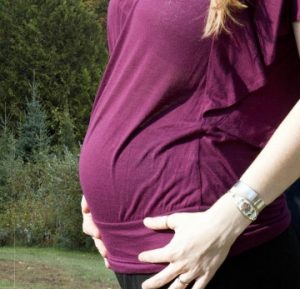One In 14 Women Has An Eating Disorder During Pregnancy
 Morning sickness, strange eating habits and weight gain are all symptoms closely associated with early pregnancy.
Morning sickness, strange eating habits and weight gain are all symptoms closely associated with early pregnancy.
But what if they were actually symptoms of an eating disorder, well-masked behind the veil of a bulging belly and impending motherhood?
A study from the University College London (UCL) found that one in 14 women suffers from an eating disorder during the first three months of pregnancy. Additionally, two percent of the 700 women questioned reported they exercised excessively, induced vomiting and abused diuretics or laxatives to avoid pregnancy-related weight gain.
Losing control of food
The study, published in the European Eating Disorders Review, also found that one in 12 pregnant women loses control and overeats twice a week — not entirely alarming given that pregnancy can cause intense food cravings but still a red flag, researchers say.
“There is good evidence from our research that eating disorders in pregnancy can affect both the mother and the developing baby,” said lead study researcher Dr. Nadia Micali, from the UCL Institute of Child Health.
The term “pregorexia” has been coined to describe pregnant women with eating disorders, and it’s a condition that can lead to serious health complications for both mother and child.
An untreated population
The study authors warn that many women are being left untreated for eating disorders during pregnancy as their symptoms are mistaken for normal side effects of being pregnant. Discussing eating disorders with a doctor while simultaneously trying to get pregnant can also be intimidating to women, who fear judgement and criticism from health service providers, says Dr. Abigail Easter, also from UCL Institute of Child Health.
The women in the study gave anonymous responses about their eating habits, suggesting that the data is a true reflection of the scope of the problem.
“Greater awareness of eating disorders and their symptoms amongst antenatal health care professionals would help to better identify and manage such disorders amongst pregnant women,” said Micali.
The study was funded by the National Institute for Health Research.
Source: Huffington Post UK
 Eating Disorder Self Test. Take the EAT-26 self test to see if you might have eating disorder symptoms that might require professional evaluation. All answers are confidential.
Eating Disorder Self Test. Take the EAT-26 self test to see if you might have eating disorder symptoms that might require professional evaluation. All answers are confidential.